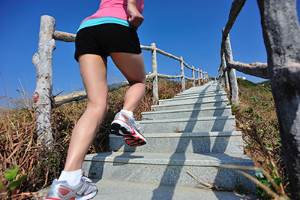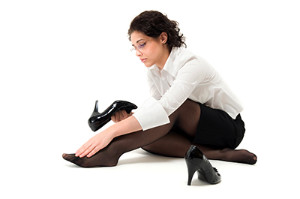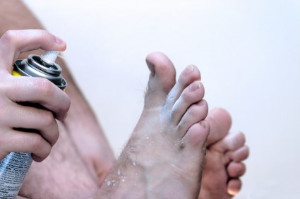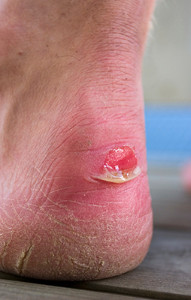Freehold (732) 294-9393
Freehold (732) 294-9393
 Those who enjoy hiking as a regular activity should be sure to employ foot care while on the trail to avoid potential pain and injury. The first step to maintaining proper foot care while hiking is to be aware of one’s surroundings. Many hiking-related foot injuries and conditions often occur as a result of not being aware while on the trail: rolled ankles, broken toes, and blisters. When hiking, be sure to wear shoes that are breathable and that either dry quickly or are waterproof. When trying on hiking boots or shoes, finding a great fit is important. With modern innovations in footwear, hiking boots are becoming lighter and more comfortable.
Those who enjoy hiking as a regular activity should be sure to employ foot care while on the trail to avoid potential pain and injury. The first step to maintaining proper foot care while hiking is to be aware of one’s surroundings. Many hiking-related foot injuries and conditions often occur as a result of not being aware while on the trail: rolled ankles, broken toes, and blisters. When hiking, be sure to wear shoes that are breathable and that either dry quickly or are waterproof. When trying on hiking boots or shoes, finding a great fit is important. With modern innovations in footwear, hiking boots are becoming lighter and more comfortable.
Everyday foot care is very important to prevent infection and other foot ailments. If you need your feet checked, contact Dr. Henry Miller from New Jersey. Our doctor can provide the care you need to keep you pain-free and on your feet.
Everyday Foot Care
Often, people take care of their bodies, face and hair more so than they do for their feet. But the feet are a very important aspect of our bodies, and one that we should pay more attention to. Without our feet, we would not be able to perform most daily tasks.
It is best to check your feet regularly to make sure there are no new bruises or cuts that you may not have noticed before. For dry feet, moisturizer can easily be a remedy and can be applied as often as necessary to the affected areas. Wearing shoes that fit well can also help you maintain good foot health, as well as making it easier to walk and do daily activities without the stress or pain of ill-fitting shoes, high heels, or even flip flops. Wearing clean socks with closed shoes is important to ensure that sweat and bacteria do not accumulate within the shoe. Clean socks help to prevent Athlete’s foot, fungi problems, bad odors, and can absorb sweat.
If you have any questions please feel free to contact our office located in Freehold, NJ . We offer the newest diagnostic and treatment technologies for all your foot and ankle needs.
 It is a commonly known fact that high heels are bad for you, with prolonged wearing leading to both a multitude of short-term problems such as corns and long-term problems such as bunions and back pain. Although women’s shoes like high heels are a popular fashion staple, they are actually considered improperly-fitting shoes that are bad for your heels, arches, and overall foot health. It is suggested to avoid heels that are higher than 2 to 3 inches, and to look for heels that have enough room in the front so that you are able to move your toes.
It is a commonly known fact that high heels are bad for you, with prolonged wearing leading to both a multitude of short-term problems such as corns and long-term problems such as bunions and back pain. Although women’s shoes like high heels are a popular fashion staple, they are actually considered improperly-fitting shoes that are bad for your heels, arches, and overall foot health. It is suggested to avoid heels that are higher than 2 to 3 inches, and to look for heels that have enough room in the front so that you are able to move your toes.
High heels have a history of causing foot and ankle problems. If you have any concerns about your feet or ankles, contact Dr. Henry Miller from New Jersey. Our doctor can provide the care you need to keep you pain-free and on your feet.
Effects of High Heels on the Feet
High heels are popular shoes among women because of their many styles and societal appeal. Despite this, high heels can still cause many health problems if worn too frequently.
Which Parts of My Body Will Be Affected by High Heels?
What Kinds of Foot Problems Can Develop from Wearing High Heels?
How Can I Still Wear High Heels and Maintain Foot Health?
If you want to wear high heeled shoes, make sure that you are not wearing them every day, as this will help prevent long term physical problems. Try wearing thicker heels as opposed to stilettos to distribute weight more evenly across the feet. Always make sure you are wearing the proper shoes for the right occasion, such as sneakers for exercising. If you walk to work, try carrying your heels with you and changing into them once you arrive at work. Adding inserts to your heels can help cushion your feet and absorb shock. Full foot inserts or metatarsal pads are available.
If you have any questions please feel free to contact our office located in Freehold, NJ . We offer the newest diagnostic and treatment technologies for all your foot and ankle needs.
 Anyone that has ever had Athlete’s foot knows how much of a nuisance it is. It itches and itches, and no amount of scratching will make it relent. The foot gets red, and pain can quickly ensue. Athlete’s foot is a fungus, and like most fungi, thrives in warm, moist environments. The gym is a perfect place for this fungus, so it is important to remember to wear sandals when showering after your workout. Keep your feet dry, make sure to clean them well, and change your socks daily. If your feet are prone to sweating you may have an increased risk of Athlete’s foot, so double your efforts in this regard. If you do contract the disease, over the counter treatment options are available, and are quite effective.
Anyone that has ever had Athlete’s foot knows how much of a nuisance it is. It itches and itches, and no amount of scratching will make it relent. The foot gets red, and pain can quickly ensue. Athlete’s foot is a fungus, and like most fungi, thrives in warm, moist environments. The gym is a perfect place for this fungus, so it is important to remember to wear sandals when showering after your workout. Keep your feet dry, make sure to clean them well, and change your socks daily. If your feet are prone to sweating you may have an increased risk of Athlete’s foot, so double your efforts in this regard. If you do contract the disease, over the counter treatment options are available, and are quite effective.
Athlete’s foot is an inconvenient condition that can be easily reduced with the proper treatment. If you have any concerns about your feet and ankles, contact Dr. Henry Miller from New Jersey. Our doctor will treat your foot and ankle needs.
Athlete’s Foot: The Sole Story
Athlete's foot, also known as tinea pedis, can be an extremely contagious foot infection. It is commonly contracted in public changing areas and bathrooms, dormitory style living quarters, around locker rooms and public swimming pools, or anywhere your feet often come into contact with other people.
Solutions to Combat Athlete’s Foot
Athlete’s foot can cause many irritating symptoms such as dry and flaking skin, itching, and redness. Some more severe symptoms can include bleeding and cracked skin, intense itching and burning, and even pain when walking. In the worst cases, Athlete’s foot can cause blistering as well. Speak to your podiatrist for a better understanding of the different causes of Athlete’s foot, as well as help in determining which treatment options are best for you.
If you have any questions please feel free to contact our office located in Freehold, NJ . We offer the newest diagnostic and treatment technologies for all your foot and ankle needs.
Read more about Athlete's Foot Blisters are one of the most common conditions that can affect the feet. Blisters tend to develop due to excessive friction between the skin of the foot and one’s shoes or socks. They are more likely to occur while wearing ill-fitting shoes or while performing certain activities that the body may not be used to doing, such as running. Blisters can be avoided by wearing friction-reducing socks, giving the feet ample time to rest in between hard-hitting sports and activity, and using paper-tape in blister-prone areas.
Blisters are one of the most common conditions that can affect the feet. Blisters tend to develop due to excessive friction between the skin of the foot and one’s shoes or socks. They are more likely to occur while wearing ill-fitting shoes or while performing certain activities that the body may not be used to doing, such as running. Blisters can be avoided by wearing friction-reducing socks, giving the feet ample time to rest in between hard-hitting sports and activity, and using paper-tape in blister-prone areas.
Blisters are prone to making everyday activities extremely uncomfortable. If your feet are hurting, contact Dr. Henry Miller of New Jersey. Our doctor can provide the care you need to keep you pain-free and on your feet.
Foot Blisters
Foot blisters develop as a result of constantly wearing tight or ill-fitting footwear. This happens due to the constant rubbing from the shoe, which can often lead to pain.
What Are Foot Blisters?
A foot blister is a small fluid-filled pocket that forms on the upper-most layer of the skin. Blisters are filled with clear fluid and can lead to blood drainage or pus if the area becomes infected.
How Do Blisters Form?
Blisters on the feet are often the result of constant friction of skin and material, usually by shoe rubbing. Walking in sandals, boots, or shoes that don’t fit properly for long periods of time can result in a blister. Having consistent foot moisture and humidity can easily lead to blister formation.
Prevention & Treatment
It is important to properly care for the affected area in order to prevent infection and ease the pain. Do not lance the blister and use a Band-Aid to provide pain relief. Also, be sure to keep your feet dry and wear proper fitting shoes. If you see blood or pus in a blister, seek assistance from a podiatrist.
If you have any questions, please feel free to contact our office located in Freehold, NJ . We offer the newest diagnostic and treatment technologies for all your foot care needs.
Read more about Blisters on the Feet